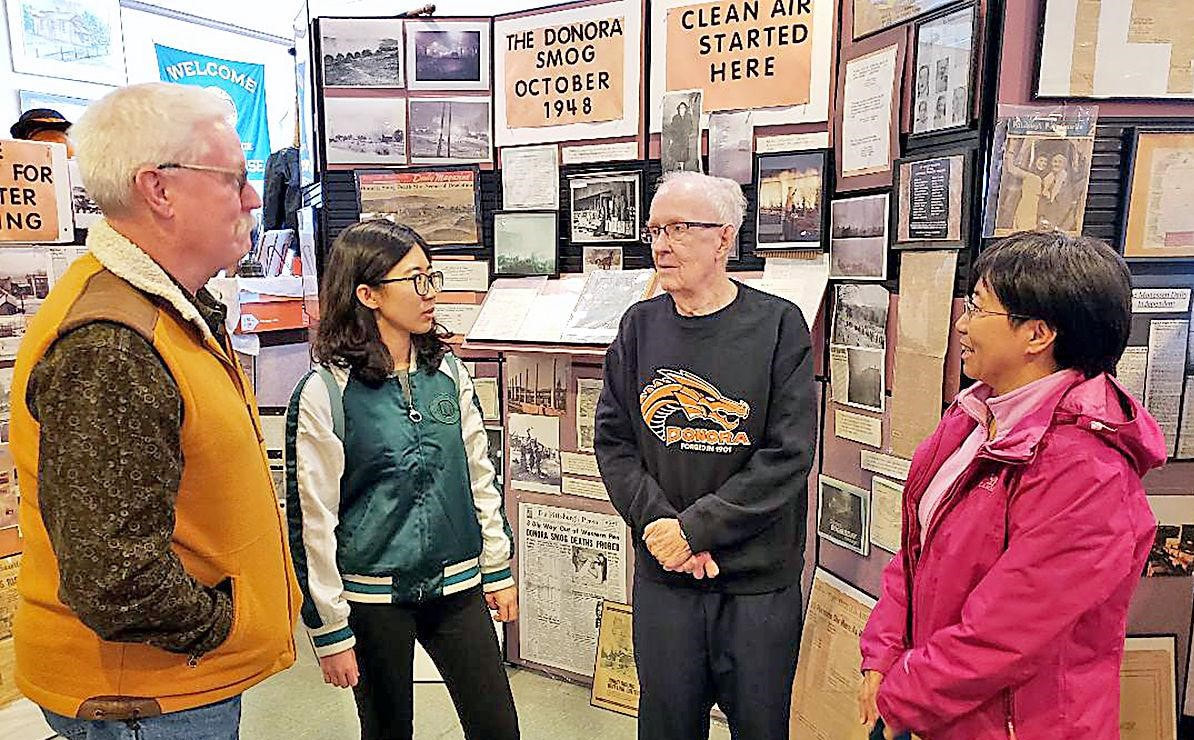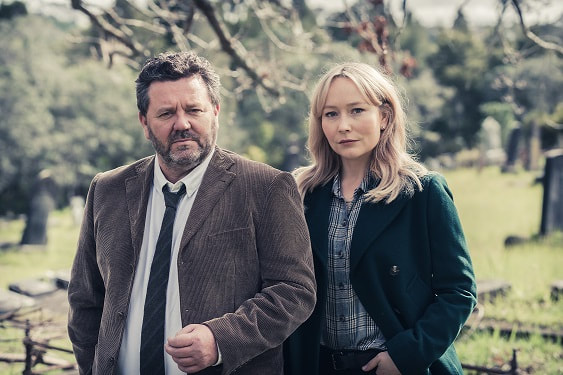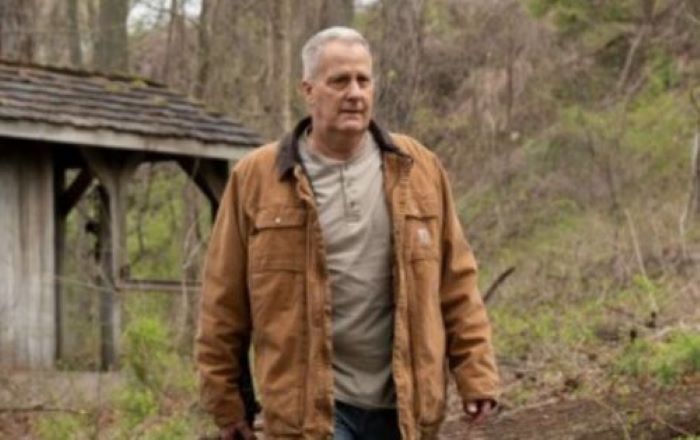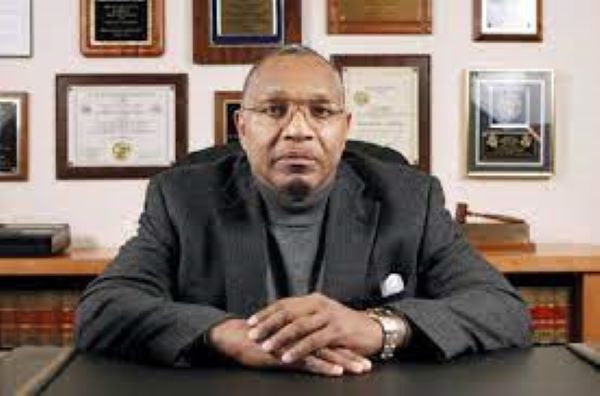|
Lately, some friends have been asking what I'm doing. My answer is, I've been trying to pitch in more -- plus keep in touch with family and friends -- plus follow the Mets. That does not leave much time for feeding my personal beast on the Web. *** We've also been discovering the little treasures that pop up on the two public channels in our area -- Channel 13 and WLIW21. For a year or two, we were caught by a Swedish series, "Before We Die" -- Stockholm cops, Euro crime family, tangled family ties -- that gave me chills I had not experienced since "The Sopranos." (Later, a British version of "Before We Die" proved to be a gabby failure.) This past winter we got hooked on a French series, "Astrid et Raphaëlle," about a Paris cop who notices that an office worker is autistic, and has the ability to notice and decipher clues, physical and psychological. Before long, the inspector is taking Astrid along on cases -- relying on her intuition. I often wonder how Astrid, the French-Norwegian actress, Sara Mortensen, manages to change gears from her introverted persona when she goes back into the real world. *** As a former news reporter, I am fascinated by the police methods in "Before We Die," and "Astrid et Raphaëlle." And that brings me to "The Brokenwood Mysteries," in a small New Zealand town that seems to have more than its share of characters -- golfers, actors, a snarky young Maori guy -- and an extraordinarily high murder rate. Good grief, we once visited friends in Wellington for a week, and NZ seemed like the most civil place in the world. The Brokenwood series began a decade ago, without my knowing, and at some point there was a new inspector with his own dark side-- Niall Rea, who makes no secret of his past divorces (three? five?) and he admits he deserved every one of them. He also has well-developed detective skills, and quickly makes the judgment that the local assistant, played by Fern Sutherland, is smart and brave, and he treats her with respect. I like the New Zealand police series whereas I scorn the British detective series on the tube because the folksy bumpkin detectives are always explaining things to the suspects. Shut up, already. Detectives keep things to themselves; they do not conduct therapy sessions for their suspects. In a recent episode from "Brokenwood," a suspect is entitled to a suave lawyer, who protects his client, Just like real life. The most recent episode of "Brokenwood" had a country music theme -- the regional star breaks the news that she is moving to, of course, Nashville. Needless to say, she does not live out the night. With my background of helping write Loretta Lynn's autobiography, "Coal Miner's Daughter," traveling around with the Loretta entourage, I am familiar with the fans -- known as "the bugs" to my old musician pals on Loretta's bus. Rea's detective, himself a country buff, notes that avid fans know everything about the mysteries and jealousies of the traveling band. "Brokenwood" was filmed a decade past, and the personnel has moved on. If the inspector and the assistant fall for each other, please do not tell me. *** More public TV: Irish music, including including a series of intimate performances in lovely Irish castles, in a series called "Tradfest." The interviewer is Fiachna Ó Braonáin, a longtime member of the great Irish band, Hothouse Flowers. My wife and I love how the musicians respect each others' work. So that's what I've been doing in my spare time, instead of typing. Just in time for Mother’s Day and Father’s Day comes the ickiest New York Times series I have ever seen -- not that the Times’ coverage by the great reporter Nicholas Confessore and colleagues is icky but because the subject matter is so icky.
The Times ran a tree-part series about Tucker Carlson, the angry widdle man who apparently is bigger than O’Reilly, bigger than Limbaugh, bigger than Hannity. And in the very same Sunday issue was a Review article about J.D. Vance, the Yale-Law-School money-man who became famous for criticizing Appalachian people without pointing out the corporate and political causes (I’m talkin’ about you, Commodore Manchin.) Vance is now, goodness gracious, running for the Senate from Ohio. And in the Monday Times is a column by Michelle Cotttle pointing out that the hottest campaigner in Ohio – better teeth, slimmer figure, more elephant-part trophies – is Donald Trump, Jr., not the doughy, grumpy-looking J.D. Vance. Yuk. What do these three worthies have in common? The answer came to me: dysfunction, broken sons lashing out at the world without a tangible speck of compassion or solution. The political party that once boasted of family values is now being represented by angry boys left adrift by parents. According to the Times’s reporting, Carlson was abandoned by his mother, whose dissolute ways led her to Europe, leaving him to claim at an early age that this had nothing to do with him. The evidence is that young Tucker drank and groused his way through his teens and into his 20s, and when he found a persona it was a critic of the left. According to the Times, Vance’ mother had the same weakness now raging through the strip--mined, job-bereft, opioid-glutted region whose sons and daughters have migrated northward into Ohio. (I spent many years writing from Appalachia and its extensions, and wrote two books about the region, and feel great bonds with the many good parts as well as the bad.) The Times reports that Vance’s mother has been clean for seven years. God bless her. When does he go to work on his own bravado and anger? If he is running for the Senate, when does he grow a bit of compassion? The third member of the testy trio is young Trump, who apparently gets more attention than Vance out on the trail. He apparently stumbled around during college, and had several blocks of time in his youth when he did not speak to his father, who was giving the world a critique of his latest hottie, and making a habit of putting his hands on women. As it happened, I had a few glimpses of the Trump ménage before the frightening White House years. (We grew up half a mile and seven years apart; his late brother Freddie was a nice guy. We have since sampled Donald Trump’s emulation of his crooked-dandy father, his disdain for his homebody mother.) When I came back to Sports in the early 80s, Trump owned a low-rent football team in New Jersey called the Generals. He knew nothing about his team – the coach, the players, the rules – which he would prove at occasional press opportunities in his gilded hotel lobbies. His alarming inability to focus on details was pointed out by his blonde wife Ivana sitting next to him, and interjecting, in her lush Czech accent “No, Donald, Walt Michaels is the coach, not the general manager.” Ivana would patronizingly correct Trump about this and that, and at some point they were divorced. Whatever the three children really felt, if anything, they eventually knew which side to take, which has led them to today. So now one child of dysfunction campaigns for another child of dysfunction while a third child of dysfunction yammers at immigrants and minorities and liberals. What a trinity, so filled with pain and anger, passed on by an earlier generation. As Mother’s Day and Father’s Day approach, it is time to give thanks for parents who stuck it out, who were a presence, who tried, who disciplined when they could, who gave, who loved, in their ways. (Mom and Pop, I never thanked you enough. You were always on our sides.) It is human to feel compassion for these three broken men, whose pain is on such public display. May they process their rage, may they learn to do less damage. May they heal. But more important, may this country heal, somehow. The terrible stuff is all over the news but baseball, as always, is a welcome diversion. It was on television and good old the radio this weekend. Pick your team; mine is the Mets. I make no apologies for the hours I spent following Good Old Howie Rose on the radio for two days and the Three Amigos on the tube on Sunday. The Mets presented their first exhibition Saturday, with Rose back in the booth after shutting down last season because of illness. He sounded himself in his haimish Queens tones (so familiar to my central Queens ear.) Rose and his radio sidekick, Wayne Randazzo, noted that spring training was delayed to mid-March as the hard heads of Major League Baseball nearly throttled their thing, but now MLB is going after all that good, clean gambling money, while clubs are playing catchup – opening days in less than three weeks. As the Mets played the Washington Nationals in West Palm Beach, Rose and Randazzo discussed the big change in rules this year – the National League has gone the way of the designated hitter after 49 years of the gimmick solely in the American League. (The New York Times has an interview with Ron Blomberg, the first DH for the Yankees back in 1973. Blomberg likes it, and why not? It is his claim to fame.) Somewhat to my surprise, Rose, 69, said it was time for “traditionalists” to accept the DH. Most pitchers can’t hit, anyway, and even those who can are in danger of being injured by putting their hands and wrists and elbows in the way of a wayward pitch. The deGrom Argument. Jacob deGrom has been my best reason for keeping the tradition, based on the good hitting pitchers over the decades – Don Newcombe of my Brooklyn Dodgers, Bob Gibson, Don Drysdale, Tom Glavine, Madison Bumgarner. (Shohei Otani, the slugging pitcher, is not just from Japan; he is from some other planet entirely.) However, deGrom is also the best argument for getting elite pitchers out of harm’s way. He was an infielder in college and is a lithe fielder on the mound, and he can also bunt and swing for power. He kept getting hurt last year, ending his season way too early, possibly because of the stresses of hitting a fastball with a wooden bat. Who wants to see Jacob deGrom’s career end early? Howie Rose was spot-on, in the opening innings of the first radio exhibition of the spring. This traditionalist gives up. I picked up the Mets’ Sunday game on television, from their camp in Port St. Lucie – Gary Cohen, Keith Hernandez and Ron Darling, warming up for their 17th season together – so savvy, so entertaining. Their show showed a clip of Lindsey Nelson doing an intro for the Mets’ historic first camp in 1962, and praised the earlier Three Amigos, Nelson and Bob Murphy and Ralph Kiner. The current Amigos let us know winter was truly over by discussing the free agents who have moved around for salaries that seem unbelievable to me. They also discussed the legacy-killing act of Robinson Cano, who is back from a second drug suspension, the knucklehead. The Amigos also talked about how clubs have to prepare fast. Hernandez, that great first baseman, noted that Francisco Lindor has a bad habit of underarming his throws on slowly-hit grounders. They speculated whether Michael Conforto could still be signed for this season --- a really good point, since he seemed a victim of the Mets' organizational anarchy last year. And Cohen, who flew to San Diego to fulfill his winter gig with Seton Hall basketball, raved about the stunning double victory by fellow jersey school, St. Peter’s.  Welcome Back, Howie Rose Welcome Back, Howie Rose True confession: just like the ball players, I am not ready to go nine, so I dozed in mid-game and caught the last segment on the radio with Good Old Howie Rose. He was talking about the deterioration of most of the Mets’ hitters last year, as the old-time batting coach, Chili Davis, got fired, replaced by two minor-league coaches, who, according to Rose, were undercut by analytics types going where they don't belong – buzzing in the ears of major-league hitters. That won’t happen again, Rose said, and I hope he’s right. In the final innings, Rose noted that the new manager, Buck Showalter, re-arranged the batting order of the anonymous late-inning subs, and imitated Bob Murphy, who used to explain the machinations of Casey Stengel or Bobby Valentine by enunciating, “I’m….sure…he…has…his... reasons.” “Come on, April 7,” Rose urged, referring to Opening Day, when the March of the Subs will no longer happen. He observed the fans, making their getaways into the choke point on the dreaded Peacock Blvd. Randazzo said he knows a short cut, albeit illegal, through a nearby gas station – the late-inning preoccupations of spring training. All seems normal. Welcome back, baseball. ---- * -- Homage to the Terry Cashman standard. And for all radio baseball fans:  Dr. Charles Stacey, black shirt, gives a tour to two Chinese students and their college prof. Dr. Charles Stacey, black shirt, gives a tour to two Chinese students and their college prof. There’s a new TV series with Jeff Daniels playing a sheriff with tangled loyalties, in a faded steel town in the Mon Valley of Pennsylvania. As soon as I heard about it, I said, “Hey, wait, I know that place.” I came to know it, and root for it, in 2009-10, when I was working on the biography of Stan Musial, the great star of the St. Louis Cardinals, who grew up where the Monongahela River twists between the hills and fading towns and dormant steel mills. Humankind has since screwed up a lot more places, probably irrevocably. The Mon Valley was a signpost, a warning, of what we were doing. After the steel mills and coal mines were played out, some people were still living in, essentially, the ruins. That is the site of the new series, “American Rust,” from the book of the same name, by Philipp Meyer, which had just come out in 2009, when I began my research on Musial and his roots. Musial’s dad had migrated from Poland to work in the mills, joined by immigrants from Europe and Africa and the east coast. I read that the new series was filmed in studios in modern high-tech Pittsburgh, but some of the exteriors were shot in Monessen, just across the Stan Musial Bridge from Donora, where Musial grew up. He played basketball and baseball for Donora High, but his first baseball tryout was conducted in Monessen, where the St. Louis Cardinals had one of their many farm teams. From what I read, Daniels’ TV town is as gray as the smoke-filled skies from the 1948 Halloween killer smoke cloud, known as “The Donora Smog.” (Stan Musial’s dad, Lukasz, breathed too much of that smog, trapped under an inversion on that October night, and was dead two months later – too much American rust in his lungs.) Musial was no longer capable of giving interviews when I worked on the book – he would die in 2013 -- but other people took me around the valley. One of my tour guides was a local hero named Bimbo Cecconi, a former Pitt football star and coach, now living up near Pittsburgh, who walked the hills of Donora and told me about the athletes from his hometown – Deacon Dan Towler of the Los Angeles Rams and Arnold Galiffa who played at West Point, and three generations of ball-playing Griffeys – Buddy and Ken and Ken Junior. Bimbo escorted me to the Donora Public Library where Donnis Headley became a helpful source. When the Donora microfilm machine was out of commission, she directed me across the river to the Monessen library, where I read old clips about Musial and the two towns. My other guide was Dr. Charles Stacey, who had been the superintendent of schools, and still lives on the main street, McKean Ave. Dr. Stacey gave me a black T-shirt with the legend Donora Smog Museum, which he had opened in the shell of a former Chinese restaurant. Dr. Stacey was also a mentor to Reggie B. Walton, once a football star on the verge of gang trouble, who willed himself to a historically Black college and a federal judgeship in Washington, D.C. Judge Walton is a Republican who has delivered decisive and apolitical rulings. As I walked around with Dr. Stacey, I expressed interest in talking to Judge Walton A week later, my home phone rang and a man said, “This is Reggie Walton….” He said Charles Stacey had asked him to call me – one of the honors of my working life. I wonder if this new series will take note of this accomplished judge who came out of the American Rust. I learned other things from my days in the Mon Valley. -- “Monongahela” is of Native American origin, meaning “river with the sliding banks” or “high banks that break off and fall down.” --A young surveyor from Virginia, George Washington, was an aide to Gen. Edwin Braddock who was killed in action further downstream in the French and Indian War in 1755. -- The names of Monessen and Donora are both amalgamations. --- Monessen’s name is a salute to the German emigrées, from the industrial town of Essen. -- Donora was named by industrialist Andrew Mellon of Pittsburgh, who built a new steel town at the end of a freight line. Mellon honored W.H, Donner, an executive who had made a lot of money for him, and also honored Mellon’s young wife, whom he had brought over from Europe -- Nora McMullen. The Mellon marriage did not last long but the odd mixture of names survives in a gritty town with memories. I came away from my visits to Donora and Monessen with the same rooting interest I have for Eastern Kentucky and West Virginia, further down the Appalachian chain, where I used to work. I cringe when I hear about the rampant use of opioids, the crime statistics, the dropouts, in Appalachia, and I gather that is the backdrop to this new series. I’ve seen a few of Jeff Daniels’ interviews on TV, and he always stresses that while he works in Hollywood or Broadway, he always goes home, to Michigan – “Fly-Over Country,” I heard him say, using the ironic term midwestern people use for their part of the country. Maybe I’ll catch some of “American Rust” sometime; (I don’t have Showtime on my cable package.) Some of the reviews I’ve read are not ecstatic, but I wonder: is Appalachia just not sexy enough for Americans? After all, “The Sopranos,” in tense urban New Jersey, was the best TV series I have ever seen, and “The Wire” made people pay attention to inner-city Baltimore. I just hope the writers – and the viewers -- do right by the Mon Valley. ### |
Categories
All
|














